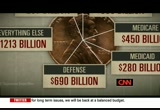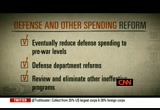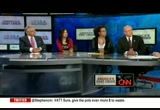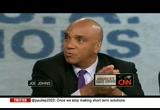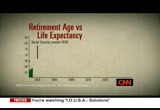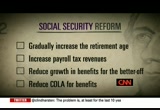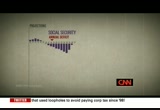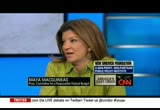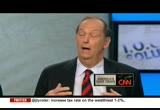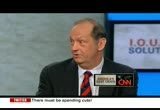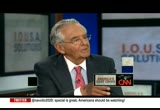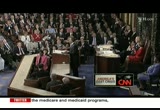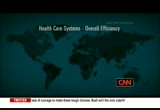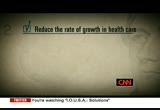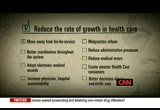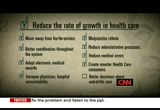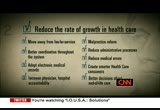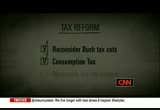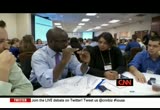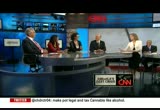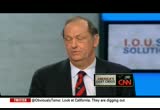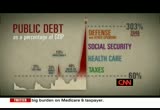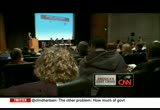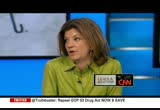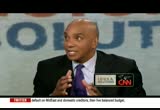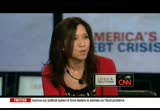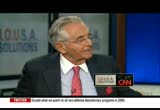tv CNN Newsroom CNN April 11, 2010 4:00pm-5:00pm EDT
4:00 pm
the federal government operates many other programs. of these, national defense is the largest. this year, including spending for operations in iraq and afghanistan, defense represents more than 1/5 of noninterest spending. >> i think we do have to look at military spending. that's been a very large cost and projected to continue to be a very large cost for the country. i think that has to come explicitly into the budget debate. >> since september 2001, law makers have provided $1.1 trillion for operations in iraq and afghanistan, and for other war-related activities. that figure could rise if additional appropriations are required later this year to support the planned increase in troop deployments to afghanistan. there is tremendous uncertainty regarding future military spending. at some point, efforts in iraq and afghanistan will phase down and military spending will once again hit pre-war levels of funding, which will have a significant impact on our long-term financial goals. we should also engage in a range of defense planning, procurement
4:01 pm
and other reforms. this includes reviewing weapons systems relative to anticipated current and future threats, making procurement in acquisition programs more effective and economical and making sure military compensation and benefit programs are affordable and sustainable. as for the rest of the discretionary budget, which in recent years has been growing at approximately the same rate of the overall economy, diligent reviews of federal programs and elimination of those that are inefrktive, outdated or no longer meet current needs will help. that goes for smaller entitlement programs, too. once you have spending in place, history shows it's hard to reel it back in. we've been talking about tough choices. amy holmes is co-host of talk radio network's "america's morning news." amy, do we have to stop playing global cop? do we have to start talking about cuts in defense? >> those are two different questions. there's the foreign policy question in terms of where do we deploy our troops to confront and face what conflicts? 77 senators voted to give george
4:02 pm
bush the authorization to go into iraq. that's something i think a lot of people tend to forget. in terms of looking at defense spending, everything is on the table. reviewing all our defense programs. we saw under george bush, secretary don rumsfeld, he did try to change the nature of our spending and the nature of our forces. more small tactical things. not the large standing armies you saw with world war ii. i think everybody across the board, this panel, anyway, can agree of course we want to cut out waste, fraud and abuse and we want an effective military. >> we talk about cutting out waste, fraud and abuse whether in health care or social security and medicare, whether in the military and defense, i think a lot of american people say i don't really trust what these bureaucracies will be able to cut the waste and not just cut the programs. >> i think the problem in making these tough choices is politicians are willing to talk about fiscal discipline and the need to start living within our means. once it comes to getting more
4:03 pm
specific with the american people, they're very reluctant to actually get specific about things that don't sound like waste, fraud and abuse. >> specifically, what are the things we should be doing? >> well, i think that specifically we have to start attacking or disciplining some of the broader benefit programs. instead of being able to just say we are going to cut wasteful medicare spending, unfortunately, some of that wasteful medicare spending isn't going to sound so wasteful to the people that benefit from those programs currently. >> that's right. one person's wasteful program is another person's very important project that must be continued that creates jobs. >> throughout the government, we need to be more future-focused and results-oriented. if you take defense, the way we go about planning and budgeting for defense is not focused on current and future threats. in fact, by law, the defense department is not allowed to consider affordability and sustainability in coming up with their requirements. as a result, we need to be much more disciplined about what do
4:04 pm
we really need versus what do people want, what can we afford and sustain and defense should not be exempt. >> the last part of that screen said review and eliminate ineffective programs. we go back to this over and over and over again. one person's ineffective program is another person's sacred cow. >> it's like pork. congress and -- >> sacred, cow, pork. >> yes. you look at one district or you look at a state. you look at the state of west virginia. for a long time had a huge problem with roads. there were so many pot holes in the roads. so senator robert byrd came up with the idea of rebuilding the road system in a lot of ways in that state. it's gotten to the point now though, he's considered one of the kings of pork in the congress. even though if you ask people in west virginia, they like those roads. they need those roads. again, it's a question of priorities. it's transparency in the
4:05 pm
congress and everybody agreeing, this is a priority in the interest of the nation. >> how is america going to pay for these promises already made? can we keep our promises on social security? that's next. e down cake, raspberry cheesecake... ...yeah, every night it's something different. oh yeah yeah...she always keeps them in the house. no no no, i've actually lost weight... i just have a high metabolism or something... ...lucky. [ wife ] babe... ♪ umm, i gotta go. [ female announcer ] 28 delicious flavors at around 100 calories each. yoplait, it is so good. indulge in new blueberry pie and new red velvet cake. yoplait light. it is so good.
4:06 pm
4:07 pm
that really hit me, and got me thinking about my health. i knew i had to get my cholesterol under control. but exercise and eating healthy weren't enough for me. now i trust my heart to lipitor. [ male announcer ] when diet and exercise are not enough, adding lipitor has been shown to lower bad cholesterol 39 to 60%. lipitor is backed by over 17 years of research. lipitor is not for everyone, including people with liver problems and women who are nursing, pregnant or may become pregnant. you need simple blood tests to check for liver problems. tell your doctor if you are taking oer medications, or if you have any muscle pain or weakness. i thought i was doing enough to lower my cholesterol, but i needed more help. what are you doing about yours? [ male announcer ] have a heart to heart with your doctor about your cholesterol. and about lipitor. ♪ (announcer) right now, all over the country, discover card customers are getting five percent cashback bonus at home improvement stores.
4:08 pm
it pays to get more, it pays to discover. this social security measure gives at least some protection to 50 million of all citizens against the loss of a job and against poverty-stricken old age. >> when the program began in 1935, the normal retirement age was 65. life expectancy was around 62. that normal retirement age stayed at 65 for decades, even as people were living longer and longer. life expectancy today is 78. over the coming years, the number of retired workers will increase dramatically, doubling between now and 2040. not only will there be more retirees, but they will be living longer. >> it just promises more than it can afford to pay for future generations.
4:09 pm
i'm not talking about way off in the future. i'm talking about people who are in the workforce now. >> there are a lot of real solutions out there. i think the hopelessness comes from it seems so inevitable, it seems like there's so much doom and gloom there's nothing we can ultimately do. but when people start participating in those solutions, they get an idea of what they are. >> whether it's raising the retirement age, whether it's increasing payroll taxes, whether it's targeting benefits towards people that need them more. >> compared to health care reform and all these other huge problems we face, our social security is probably relatively easy. i say relatively. >> one way to fix social security is to increase the retirement age over the next 10 to 15 years and index it for future improvements in life expectancy. if done gradually, those who are already retired or nearing retirement age will not be affected by the changes at all, and it will give younger americans time to plan for the adjustments. >> slowly, over time, adjust the retirement age.
4:10 pm
after all, when social security was first initiated, people weren't living much past 65. now we've got people living to 100. >> now that people keep their vitality past 65, i think it's important to have people working and contributing to the economy and saving well past 65. >> another option is to raise more revenue for social security. >> we need to get more money into social security. >> social security is in financial difficulty. >> cash deficits for social security are expected to escalate in the future. to reach an estimated $300 billion in 2025, and $1 trillion in 2048. >> for the long term, we know there is an unfunded liability there that's going to have to be met, so it's very much in our interest to reform social security so it's there for the future. >> how is america going to pay for the promises that it's already made? can we keep our promises on social security? this documentary is called
4:11 pm
"i.o.u.s.a. solutions." it could have just as easily been called "tough choices." raise the retirement age, tax the rich, have the rich pay more in taxes, but get fewer benefits. what among these is the right approach here? >> probably the right approach is to end up doing a little bit of everything. i think the place you start is certainly the retirement age. everybody recognizes when they look at the demographics of the situation we are living longer than we used to and we are still retiring early and spending a lot of our living years collecting money from the government. we just can't afford that. a lot of people want to work longer and should. so you raise the retirement age gradually and index it for growing life expectancies. you understand some people will collect disability because they won't be able to work as long because of the nature of their job or their abilities, and he -- you restructure the program accordingly. it's the not going to close the gap on its own so you have to do other things. i think the next place you look
4:12 pm
is changing the structure of benefits for people who need them the least. you want to keep them strong for people who depend on the program but slow the growth for people at the high end who don't need it as much. if you look at revenues, you have different ways to do it. raise the payroll tax cap or you could also have more people putting more money into private savings to augment their social security. in the end, and i think this is true for the budget problems, you have to create a basket of everything. there are constituencies who want to protect all programs, don't want to raise taxes, don't want to cut spending. reality, we have to deal with some of all those. that applies to social security. i do think retirement age and working longer is the key to this problem. >> so people don't get scared, about raising the retirement age, when they say gradually they mean a month every two years and adjusting it, as you say, for life expect tansy. they really do mean gradual. they don't mean it's going to be 67, 68, 69 then 102. are. >> it's so funny. we talk about all these things in the abstract but we know the reality is that social security is considered the third rail of american politics.
4:13 pm
and it is, i think, still a tough haul. senator bradley, we've been talking about this. you say you can do it. i just wonder if, you know, this age of baby boomers retiring is any different from the last age of people retiring. >> that's the basic rap. you can't do anything. just my reflection, in the early '80s, social security was going to go bankrupt. i would conduct town meetings, 400, 500 people, majority seniors. i would have a professor from the university lay out the options and we would discuss it. seniors would say, well, i don't want my children to pay more taxes. maybe i'll cut a little bit of my benefit. someone else would say, i would work a little longer. you ended up with a proposal i felt quite comfortable with when it came from the commission, because i'd already done the
4:14 pm
work with my constituents and realized they could buy a retirement age increasing from 65 to 67, which it did. some increased taxes and some changes in benefits on the cpi. that's where we are now. we have to stop demagoguing the issue and focus on the real facts and what's at stake. social security is the best program the federal government's ever passed. it's a compact between generations. there is now a generational compact that needs to be made in terms of reducing the budget deficit overall so that we don't burden young people. if you take a look at domestic nonelderly, nondefense spending, it is at the lowest point since 1940 as a percentage of gdp. let's keep in mind where the spending takes place. that's where we are going to help solve the problem. >> i wanted to quickly jump to you. you said something interesting at the break. you said be careful about
4:15 pm
talking about cutting waste, cutting fraud, even these two wars eventually ending. all together, that still is a small part of the problem. that's why you think social security should be the first thing to go after. >> it's hard to avoid the entitlements if you do simple math. if you got rid of all the bush tax cuts, which not many people are proposing, if you got rid of all the earmarks that people keep talking about, if you got out of both wars, you would only solve somewhere between 10% and 15% of the problem. so it is absolutely essential that you get where the money is. it's very important on the entitlements. >> leave it there for the moment. move on to the next hottest topic, that's health care. why health care plays a huge role in the national debt and why the story behind it is a source of a great deal of
4:16 pm
4:17 pm
4:18 pm
4:19 pm
put simply, our health care problem is our deficit problem. nothing else even comes close. >> with the adoption of health care reform legislation, it is more important than ever that we find ways to reform our health care system. otherwise, costs of health care, including the cost of newly enacted benefits and subsidies will continue to rise putting our fiscal outlook at greater risk. >> if i were to worry about how we are going to have a sustainable financial future for the united states, health care would be at the top of the list of things i would worry about. >> well, i would say long term the story is overwhelmingly historic health care.
4:20 pm
our health care costs are way out of line with the rest of the world, and the projections get even more out of line in coming decades. >> we have a medicare cost crisis, but it's even more true that we have a national health cost crisis. we cannot solve the medicare cost problem unless we solve the problem of cost for all of our nation's health care. >> people want health care, and the average cost is rising very, very rapidly. >> this country spends more per person on health care than any other country, and by no metrics are we getting the most for our money, so there's clearly a problem of what we're getting for all the money we're spending. >> as educated as i feel like i am, i still feel disenfranchised from the conversation. i don't think i could even get involved in it. >> the health care conversation? because you don't understand it?
4:21 pm
>> yeah. don't get it. >> there is a feeling of all these benefits we used to get are getting harder and harder to come by because of the costs. i don't know where the costs lie. is it the fault of the insurance companies or is it the fault of the medical providers because they're doing unnecessary things? it's kind of hard to sort it out. >> we ought to be trying now a number of strategies that will slow the growth of health care costs. >> the passage of the health care bill is just the beginning. now the real work begins. we must address the rapid growth in health care costs, which is absolutely essential to our economic and fiscal future. to do this, we will need to make a number of changes in the way health care is delivered, financed and consumed. >> we have to look at the way we pay our doctors and our hospitals. >> the current way we pay for most health care in the united states which is an individual fee for a specific service, referred to as fee for service medicines. we pay hospitals that way, by and large, and we pay physicians that way. that rewards physicians for doing more services regardless of whether they're beneficial to
4:22 pm
the individual patient or not. it rewards hospitals for keeping their beds full even if it's better for the patients not to be readmitted. >> one of the most important things for the public and for the profession to understand is that more is not necessarily better when it comes to health. >> we basically have a delivery system which rewards quantity over quality and does not tie quality to value. >> so we need to move away from fee for service payment. the second issue is that we have a fragmented delivery system where hospitals, fphysicians, nursing homes, each are working independently with no coordination among them. the fragmentation in the u.s. health care delivery system is one of the problems we think is so important to a he dress. electronic medical records have tremendous potential to help. by providing a common record that all of the physicians who are taking care of you can see could markedly improve
4:23 pm
coordination. if you have a chronic illness, you need your care taken care of months and years. we have no accountability to improve your care as an individual. putting those things together, better payment systems, better information systems, and ways of holding physicians accountable with hospitals, then we could really drive improvement in the health care system. >> some other ways include enacting malpractice reform, reducing administrative processes, reducing medical errors and creating smarter health care consumers. in the current health care insurance system patients are often unaware of the true costs of medical tests and procedures. when you purchase something from a store, it comes along with a clear price tag. the same should be true of health care services. >> with respect to health care, a large fraction of it is not paid out of pocket, but rather paid by insurance. so we are insensitive to prices. >> one way to change this is to show the total cost of compensation, including the
4:24 pm
employee's share on pay stubs. this way employees can see how much of their compensation is in health care, not just cash. finally, we need better decisions about end of life care. about 30% of all medicare payments are on behalf of people who will die within a year. we should encourage compassionate ways to handle difficult health decisions at the end of life that will lead to appropriate levels of care. these and other steps could help slow the rate of growth through our entire health care system. >> which ones save the most money and which ones can work? >> the ones they listed there, the efficiencies, the end of life care, those could be big savers. the thing about the health reform law, congress needs to stick to what it wrote. if it doesn't, the cost reduction potential is lost. two things in the health reform law, though, that deficit experts around this table and elsewhere in life, are the reducing -- imposing an excise
4:25 pm
tax on insurers which reduces the tax benefit we get when our employer pays for insurance. and the medicare payment advisory board, which would advise congress in a way congress would have to listen about how to control spending, excess spending in medicare. if they weaken those, we are in trouble. >> we are not close to being done on health care and health care reform and how that fits into this whole debate. why a change in your taxes could play a very big role in the securing the future of your country. it's the chevy spring event. and everyone deserves a car, truck, or crossover they can count on. like these consumers digest best buys. and all backed by a 100,000 mile powertrain warranty. discover for yourself, and see why over a thousand people a day are switching to chevy. during the spring event, qualified lessees can get a low mileage lease on this new malibu ls for around $199 a month. call for details. the switch to chevy starts at chevy dealer dot com. ♪ could open a world of wonder ? ♪
4:26 pm
4:27 pm
if those boxes are under 70 lbs. you don't have to weigh 'em. with these priority mail flat rate boxes from the postal service, if it fits it ships anywhere in the country for a low flat rate. no weigh? nope. no way. yeah. no weigh? sure. no way! uh-uh. no way. yes way, no weigh-ing. priority mail flat rate box shipping starts at $4.95, only from the postal service. a simpler way to ship. to create thermocontrol™. designed with the comfort of athletic fabrics in mind, stayfree® with thermocontrol™ quickly wicks moisture away for exceptional dryness. thermocontrol™ only from stayfree®. "what do you mean homeowners insurance doesn't cover floods?" "a few inches of water caused all this?" "but i don't even live near the water." what you don't know about flood insurance may shock you. including the fact that a preferred risk policy
4:28 pm
starts as low as $119 a year. for an agent, call the number on your screen. before the break, we talked about ways to reduce the growth rate in health care costs. two other options, prevention and wellness as well as medicare reform. again, tough choices. seniors are pretty powerful and vocal voting block.
4:29 pm
amy, prevention and wellness might be tough in a country where the worst food is the cheapest. >> right. >> how does prevention and wellness fit into this? >> i think it's a very large piece of this. i worked for senator bill frist, a medical doctor and heart/lung transplant surgeon. when he was majority leader of the senate, i was his speech writer. i used to write speech after speech about this. he passed the prescription drug plan in part because it did have that preventive and wellness feature to it. you could take a pill instead of an expensive surgery down the road. we haven't mentioned medical malpractice. that was another big issue he tried to go after. that's defensive medicine, where a doctor is giving you test after test because he doesn't want to get sued. that drives up the cost of health care and drives doctors out of the profession. you see ob-gyns are not serving rural communities because their medical malpractice bill is so high. >> david walker, you say something about health care reform. you say health care is still going to be the thing that's going to bankrupt this country
4:30 pm
if we don't get it right. we talked about expanding coverage, but not about containing costs. that's still the problem. >> the single largest challenge our fiscal future is health care cost. if there's one thing that could bankrupt america it's out of control health care costs. the last health care reform was about cover expansion. it wasn't about cost reduction. medicare is underfunded $38 trillion already. the medicare prescription drug added $7 trillion to $8 trillion in underfunding. we need to start dealing with that. >> i want to go back to that. we didn't pay for that, right? >> right. it's controversial. because of that it did get bipartisan support. but it adds -- i agree. >> hurray, we didn't pay for it. >> it adds to our debt. there was supposed to be some savings because of prescription drugs, as i mentioned. this is an issue and a topic we have to address head on. i agree. >> how does health care fit in in your view here? we've gone through this very tortured health care reform and -- >> and didn't get a lot from it in terms of the long-term
4:31 pm
challenge that we face. david's absolutely right that it was more about expanding coverage than containing costs and addressing our current -- the challenge we already had before we started this reform process. i think it's going to be a really difficult and long road to containing health costs. it is our number one challenge. we don't know the solutions yet. we're sort of learning as we go along. it's going to take a long time for those policy choices and the possible solutions to materialize. in the meantime, i think we have to be looking at the easier parts of the budget. >> there are easy parts of the budget? >> social security used to be the third rail, but i'm not so sure there are so many other third rails around now that may look worse. >> let's talk about health care reform quickly. i want to stay on this subject. all of these different things that the film brings up, moving away from fee for service, better coordination throughout the system, adopting electronic medical records, increasing physician and hospital accountability, malpractice reforms, yes to all of them? >> yes.
4:32 pm
many of them are already in the bill that just passed. what's really depressing is that health care is the biggest problem facing the budget. we just went through a painful process to reform health care and we didn't get nearly enough in terms of medium or long-term cost savings. yes, it will reduce the deficit very slightly over ten years, but compared to the overall size of the problems it contributes? it's a drop in the bucket. nobody wants to have to go back and do this again. unfortunately, we do. i think we are going to have to look at some other pieces of this. more of what's in the bill in terms of controlling costs, more in terms of the excise tax making this medicare commission stronger and being able to have a greater say in how to generate savings. savings in medicare overall. medicare is still unsustainable. i also do think we strongly have to look at the side of consumers, where there is a problem where in a sense we have, in the country we have a sense health care is free. when you go to the doctor, you don't pay much money and you don't know how much it costs. we need to improve transparency. the bottom line for the government is when you're
4:33 pm
budgeting, you're supposed to make a budget. we don't have a budget for health care. we kind of have this open-ended promise, no matter how quickly costs are going up, we cover them. we need to put a strict budget on health care and other pieces of the budget. therefore, live within our means. that's going to mean tough choices in terms of how much people pay, how much you can get, different things that you qualify, things we have to only pay for what works instead of things that might work. we're going to have to go back and do a lot more on the health care front as well as other parts of the budget. >> the health care issue is not settled just yet. the calendar says it's april. that means taxes are on everyone's minds. up next, we'll tell why you taxes could play a big part in securing the future of this country.
4:34 pm
4:35 pm
drive one. imagine... one scooter or power chair that could improve your mobility and your life. one medicare benefit that, with private insurance, may entitle you to pay little to nothing to own it. one company that can make it all happen... your power chair will be paid in full. the scooter store. hi i'm dan weston.
4:36 pm
we're experts at getting you the scooter or power chair you need. in fact, if we pre-qualify you for medicare reimbursement and medicare denies your claim, we'll give you your new power chair or scooter free. i didn't pay a penny out of pocket for my power chair. with help from the scooter store, medicare and my insurance covered it all. call the scooter store for free information today. call the number on your screen for free information.
4:37 pm
here's the situation we face. over the long term, the real budget problem is that of growing government spending. spending cuts are going to have to be part of the solution and a big part, but there's no way we can close the budget gap that we face without also raising taxes. >> the political system is clearly broken in fixing this problem, but our political system is really a reflection of our own personal preferences as a society. we believe that we are entitled to ever-lasting prosperity with increasingly large government benefits from the cradle to the grave, but we equally feel like we don't have a responsibility to pay for it. we are socialists when it comes to spending and libertarians when it comes to taxes. >> we are going to have to decide which of the bush tax cuts should be expended in whole or in part, and which ones should be allowed to expire or otherwise scale back. >> if the 2001 and 2003 bush tax cuts are extended, the revenues
4:38 pm
of the federal government will decrease significantly. >> the cost of bush tax cuts is about $2 trillion over ten years, and to put that in perspective, that's double the cost of expanded health care coverage that everyone's complaining we can't afford. >> matter of fact, not only do i think we ought not to raise them, i think we ought to make every tax cut we pass permanent. >> one of the things that i noticed in the past several years is that you can't even discuss revenue increases or tax increases. taxes can only go one way. they can go down. >> recent estimates by the congressional budget office conclude that by letting the bush tax cuts expire, federal tax revenues would go up by an average of 1% of gdp a year or about $2.6 trillion over the next ten years. but that's not enough to solve our problem. finding other revenue sources may be unavoidable. >> we're going to have to look at consumption taxes like a value added tax or some form of national sales tax as a
4:39 pm
mechanism for maintaining some of the benefits that we are promised through our entitlement programs. >> all the industrial countries have a national sales tax of some sort. >> consumption taxes would do more than just raise revenues. they would make consumer spending more expensive, and could help encourage people to save more of their incomes. that, in turn, would increase domestic savings and reduce our reliance on foreign lenders. another way to close our long-term gap is to modernize the tax system. >> the current tax system is just deeply flawed. it's been amended repeatedly over many years and it's really become a monstrosity. >> the system is confusing, outdated and filled with loopholes. there are many tax preferences that result in almost $1 trillion in lost revenue every year. the special tax treatment of employer-paid health care and home mortgage interest payments
4:40 pm
are the two largest examples. furthermore, our complex and burdensome corporate tax system puts american companies at a competitive disadvantage internationally. >> i think our tax system has gone very much awry in the last ten years. >> streamlining and eliminating many of those tax loopholes could bring in a lot more revenue for the government. >> i think it's going to require us to write a new tax system, one that's more fair. >> the world has changed many times on taxes over the years. if you read the history of the tax code, there have been a lot of swings in both public opinion and activities in congress. one thing i can promise you, it will be different 20 years from now. >> there is no other way around it. two ways to make a dent in national debt, cut spending or raise taxes. we've also talked about tough choices that need to be made. david walker, is it time to eliminate the bush tax cuts? >> not all of them. not all tax cuts are equal. very few tax cuts pay for themselves. we ought to focus which of the tax cuts bush had, promote economic growth, savings and
4:41 pm
investment. there are some that don't do that in a measurable way. we need to reconsider those. >> i agree with that entirely. as pete mentioned earlier, even if you did and you eliminated the wars and all the earmarks, that only gets to 15% of the problem. we need a tax code that encourages entrepreneurship. you were saying during the break if we made every congressman sit at his own kitchen table with a ball point pen and calculator, and do it without h & r block, you'd get reform in a year. >> or turbotax, no software. diane? >> there are two questions. one is are we raising enough revenue to cover our bills? right now it's obvious we are not. we don't have a sustainable federal tax system. a separate question is how once you decide the right level of revenue is, how to raise it. nothing says we have to stick with any combination of the bush tax cuts, in fact, current law says they're all going to go away at the end of this year. congress and the administration are going to have to decide what they want to do. do they want to continue bush tax policy or replace it with something new? >> bill bradley?
4:42 pm
>> you have to think about the structure of the income tax system. let's take two principles. one is equal income should pay equal taxes. people should be able to agree with that. that is not what the current system is. those who use loopholes pay less than those who don't and push the rate up for the rest of us. second, it should be the lowest rate for the greatest number of americans, thereby stimulating savings, investment, et cetera. it is possible to have an income tax system that raises additional revenue at the same time it drops rates and closes loopholes. closing loopholes are the means by which you drop the rates and also increase the progress toward reducing the budget deficit. >> senator bill brandly, there's an overwhelming feeling that america's debt crisis is going to be the problem of the next generation. we'll talk to three members of that generation, next. ng.
4:43 pm
that's peace of mind for every size family. chevy... may the best car win. so i got my nephew to build a website. i hired someone to make my website... five months ago. we are building a website by ourselves. announcer: there's an easier way. create your own small-business site with intuit websites. just choose a style that fits your business and customize, publish and get found in three easy steps. sweet. all from just $4.99 a month, get a 30-day free trial at intuit.com. key lime pie, pineapple upside down cake, raspberry cheesecake... ...yeah, every night it's something different. oh yeah yeah...she always keeps them in the house. no no no, i've actually lost weight... i just have a high metabolism or something... ...lucky. [ wife ] babe... ♪ umm, i gotta go. [ female announcer ] 28 delicious flavors at around 100 calories each.
4:44 pm
4:45 pm
client comes in and they have a box. and inside that box is their financial life. people wake up and realize i better start doing something. we open up that box. we organize it. and we make decisions. we really are here to help you. they look back and think, "wow. i never thought i could do this." but we've actually done it. [ male announcer ] visit ameriprise.com and put a confident retirement more within reach. [ male announcer ] visit ameriprise.com and now, cheer presents: next time on "brighten bay"... who's the angel that saved sandy?
4:46 pm
and more importantly, how does he get his whites so bright? find out with cheer. surprisingly bright at a new lower price. it's another thing to back it up. the chevy 5-year/100,000 mile transferable powertrain warranty. with roadside assistance and courtesy transportation, it's the best coverage in america. if we wait until 2030 to balance the budget, we'll have to cut spending by 48% or raise taxes by 64%, which is equivalent to more than dugling individual income taxes. these percentages rise with the passage of time. therefore, we need to start now to determine how to put our nation's finances in order. >> the problems we are facing are not going to be solved without making some very fundamental choices. you can't take things off the table.
4:47 pm
bottom line is, whatever government chooses to spend, eventually it's going to have to tax to pay for. that's the way government pays for things. there's no magic. >> our four main areas, defense and other spending, social security, health care and taxes, are the corner stones for our major financial reform in america. the sum total of all these ill lus tritive reforms are one way to get us to the 60% of gdp target. many other combinations and solutions are possible. what is critical is that we get started. >> you have to make tough choices. on spending constraints, on social insurance reforms, on health care costs, on tax reforms, tough choices are inevitable. >> do you see any of those choices made while you are here? >> no. that's why you need a special process. they won't be made, in my opinion, senator. they won't be made in regular order because the regular order
4:48 pm
is dysfunctional. >> there is no serious person that has looked at our projected growth in debt and not concluded we are on an unsustainable course. there's some very tough decisions that have to be made, but in some respects they are tough politically, not necessarily economically. >> sadly, perhaps tragically, the long term is now right next door. it's right around the corner. >> right now there is a strong sense by a large number that fiscal constraint is essential to be applied now. the longer we wait, the more difficult it will be. >> the american people have shown if they're told the truth about a problem, they'll face up to it and they'll support action, and that's really what's required now. >> our challenge is to act sooner rather than later. >> determining which areas will experience the greatest level of reform is where we as a nation need to decide. >> seeing where our generation stands on these issues, you hear
4:49 pm
from people all over the spectrum, there is a lot of agreement going on here. all of us seeing we do agree on these things is encouraging. >> as long as this stuff still happens, you can cut this apartment in half and we'd still want to have dinner together. we'll figure it out. >> i would definitely say this is a group of fighters. even though a lot of us may feel overwhelmed by it, i don't think we are going to be concurred by -- conquered by it. we are the generation that feels that we can do this. >> three of the millenials. sally westkoth, nikola moore and drew novolya. you guys seem strangely optimistic. where does that mentality come from, sally? >> well, i think that comes from being challenged so early. a lot of people we talked to, senators, congressmen, women, have been giving us this challenge since we started talking to them.
4:50 pm
saying, hey, it's up to you. this is a really big issue we need to deal with. i think we're just confronting it head-on and saying, look, we need to start early and we need to start now. it's just the challenge of it that's making us optimistic, i think. >> nikola, a challenge, we've been talking a lot this hour about sacrifices. do you feel as though you and your generation are going to have to make sacrifices? what fak fiss sacrifices are you willing to make to fix this problem? >> i think we'll have to make sacrifices. one of the things that will be absolutely crucial is to have an intergen rational dialogue with our parents and our grandparents about the types of sacrifices that they're willing to make as well. if i have to pay higher taxes, maybe my grandparents will have to take a slight benefit cut. they probably are not going to like me saying that on national television. i think all of those different types of sacrifices need to be made collectively and together. >> you just got less money in your birthday check this year from grandma and grandpa, i guarantee it. they'll tell you to put that
4:51 pm
toward your own future. drew, what about sacrifices from your point of view? we are all talking about higher taxes, cuts in spending. we are talking about dramatically remaking the health care system. maybe your generation, you are going to have to work longer before you're going to be able to retire. maybe if you, god willing, make a ton of money in your lifetime, you're going to pay higher taxes in exchange for those social security benefits. what are you willing to accept? >> i think that's pretty much inevitable. i don't think those sacrifices are things we have a whole lot of choices about. i think our generation is going to grow up and things are just going to be different. we're going to have to live in a different environment both economically and socially and politically. those sacrifices, we are making them now. as our generation gets older and we come to the work place and are starting to get an understanding of what it means to have apy check and having to invest for retirement, we understand the scope of things. we are a smart generation. i would 100% agree with the point made this is going to be a conversation that isn't just internal with our generation. we've got to make sure we know what we're doing by getting advice and information and
4:52 pm
wisdom of those generations that came before us. they've seen tough times, too. this is tough, but i don't dount there's any question we'll be able to get through it and be better in the long run. >> all right, part of that intergenerational dialogue. thank you very much. >> we talk about the debt, we talk about how it affects the future, our living standards. what should be done right now? what should we be doing right now? the solutions next. [ sneezes ] ♪ music plays ♪
4:53 pm
[ sneezing ] ♪ ♪ [ male announcer ] what are you gonna miss when youave an allergy attack? benadryl® is more effective than claritin® at relieving your worst symptoms -- runny nose, sneezing, and watery eyes -- and works when you need it most. benadryl®. you can't pause life. [ indistinct talking on television ] [ laughs ] what's that? [ inhales deeply ] that's last night's dinner. [ male announcer ] hate lingering odors? [ baby cries ] ♪ [ male announcer ] febreze air effects actually eliminates odors caused by bacteria
4:55 pm
4:56 pm
allowing us to show this documentary. i have two questions for our panelists. can we fix it and what can we do to get started? >> we can fix it. it's a political challenge. the problem is do we have the political will? we talked about a lot of things today. the honest truth is that the fiscal challenges are so big now that all of them are going to have to be part of the solution. we need leadership that puts out it's going to be more than waste, fraud and abuse. it's going to be more than a few earmarks you don't like. we're going to have to fundamentally restructure our budget, then we can get ahead of the problem that threatening our well being. >> bill bradley? >> as long as we tell people the truth and put country ahead of party, i think we'll be able to solve this problem like we've solved many problems in the past. the key thing is truth. the key thing is letting citizens know they're part of the solution. they have to participate. they have to know what's in the budget. they have to make the trade-offs themselves. to the extent they don't, we'll be much more difficult. to the extent they get involved, it can happen. >> i would add to that the same
4:57 pm
thing applies to law makers who are sort of the front line of this problem. they really need to stop defending their party and place and deciding we have larger problems to address. >> having studied this for a long time, it seems to me it's grassroots issue. people have to get their heads around the idea of what it means in practical terms to them. what you're talking about here, you're going to have to bite the bullet. it's about the mortgage deduction and getting rid of that. it's about perhaps getting rid of fee for service health care. it's about a whole lot of different things that affect people's lives very personally, but it's for the kids. >> david walker? someone else who's thought about this for a very long time. >> we can solve the problem if we get truth and leadership, and if the first three words in the constitution come alive, "we the people." we the people are responsible and accountable. we're going to have to push our elected officials. sooner we do that, the better. the clock is ticking and time is not in our favor. >> amy holmes? >> i agree with that. i think it's a philosophical question.
4:58 pm
the citizen has to ask, what is the role of government and what should the government do? i am so optimistic. we are an entrepreneurial, optimistic country. those young people who were here earlier, i am so inspired by them. it is about the citizen holding our elected leaders' feet to the fire. they can do it this november. >> diane? >> i'm also very optimistic. just as we heard from that family, when you have to live within your means, when constraints get tighter, you learn to prioritize. sometimes in prioritizing you learn what's important to you. >> pete peterson, you said you were worried we hadn't talked enough about savings. >> well, i think there are a few things we need to do more of to increase savings. in the first place, it makes us much less dependent on foreign capital. in the second place, it provides money for r&d and investment that we need to be competitive. it seems to me the tax system should go in the direction of increasing savings, which is on
4:59 pm
-- by disincentives on consumption. we can't consume and save dollars. in terms of optimism, i remind you of what happened after the second world war. our public debt was about twice what it is now. 122% of the gdp. the american people, as dave suggests, were told the truth. there was great leadership. what did the american people do? they reduced the debt to something like 20%, 25% of the gdp by the '80s. they paid for the biggest infrastructure program in history, highways. they paid for the marshall plan. they paid for the gi bill. why? because they understood as dave says, by virtue of the leadership, what the truth was and what they needed to do. >> and embarked on a great period of prosperity. the moral of the story is don't count the united states out. this de
154 Views
IN COLLECTIONS
CNN Television Archive
Television Archive  Television Archive News Search Service
Television Archive News Search Service 
Uploaded by TV Archive on

 Live Music Archive
Live Music Archive Librivox Free Audio
Librivox Free Audio Metropolitan Museum
Metropolitan Museum Cleveland Museum of Art
Cleveland Museum of Art Internet Arcade
Internet Arcade Console Living Room
Console Living Room Books to Borrow
Books to Borrow Open Library
Open Library TV News
TV News Understanding 9/11
Understanding 9/11